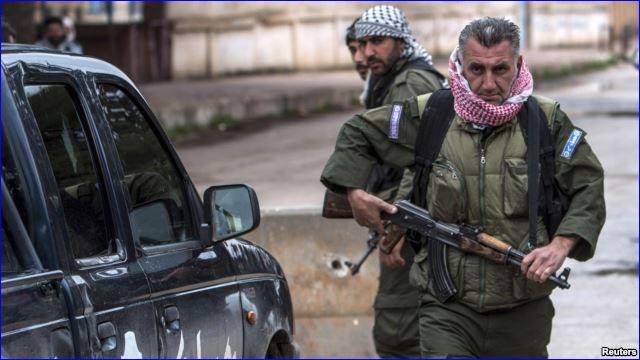


For the past week, about 450 militiamen have tried to defend four Assyrian Christian villages among a cluster of 30 ancient settlements in Hassakeh province that had survived more than two millennia of war, invasion and insurrection.
Isis has shelled the area from its outskirts, ransacked its ancient core, and chased men, women and children into exile, capturing at least 300 hostages and killing dozens more. In doing so, the jihadi group has all but fulfilled its pledge to rid the area it controls -- from Raqqa in Syria to Mosul in Iraq -- of anyone who does not submit to its draconian ways.
The purge has led to the plains of Iraq's Nineveh province being emptied of its entire Christian population, as well as of Yazidis, Shabaks and Turkmen. Until Isis stormed through the area last August, roughly 80,000 Chaldean Christians had continued to live there even after the US invasion of Iraq in 2003 -- which saw the number of Iraqi Christians fall by more than 70%.
In Syria though, the upheaval across the border, its own civil war and then the rise of the jihadis had not had the same existential effect on the Assyrians. Until now. Last Monday, an estimated 8,000 Assyians remained in the heartland area near Hassakeh province. That number could now be as low as 2,000 and is falling fast.
Sanhareb Barsom, an official with the Syriac Union party, which is providing humanitarian aid to the refugees, said that 100 families from the besieged villages had settled in Qamishli, while 2,000 refugees have fled to the provincial capital, Hassakeh. He described the situation as "catastrophic".
"These people have broken down," he said. "Their emotional state is very bad because some of the families have had members taken captive by Daesh."
Kino Gabriel, one of the leaders of the Syriac Military Council, an Assyrian Christian militia, said the fight was existential. "[We are] like a tree that you uproot from its land," he said. "We are a people with a historic lineage. We have been contributing to human civilisation for five or six thousand years, and we can still give."
The fighters, along with modest Kurdish reinforcements, are trying to defend Tal Tamr, a town that straddles a tributary of the Euphrates river. The Assyrians in the area had taken refuge there three generations ago, fleeing the Simele massacre of their people by the Iraqi kingdom.
The Isis attack on the villages appeared tailored to draw forces away from Tal Hamis, where it is battling a Kurdish push aimed at forcing the group further to the east. The fate of the hostages remains unclear, with some members of the community believing Isis intends to trade them for its own captured fighters, or use them as human shields. Others though, mindful of public executions of Egyptian Copts by Isis militants in Libya, fear a similar grisly spectacle.
"We will defend ourselves," said Gabriel. "We will not allow another Seyfo to happen to us [in reference to a pogrom perpetrated by the Ottoman's early last century]. We will sacrifice everything."
"We want help and support from all the democratic forces in the world that are fighting the extremism in the Middle East, to stop these enemies of humanity," he said. "Their targeting of our people, the Syriacs, has been ongoing. What they did in Iraq ... and [elsewhere in] Syria shows that this is what they want.
"After a couple of generations, the culture will disappear. Nobody will remember us."
The Assyrians say they deserve support like the Kurds in Kobani, the peshmerga in Iraq and the Yazidis on Mount Sinjar. "We stood with Kobani and supported the resistance there and we are now facing the same thing," said Gabriel.
He urged coalition air strikes to protect the remaining population and what is left of the Assyrian civilisation, just as they protected the Kurdish town of Kobani to the west. The air strikes saved Kobani from falling to Isis, but destroyed at least 50% of the town in the process.
The Kurds of north-eastern Syria and northern Iraq remain the only robust minority presence in the area now, and most of the Nineveh exiles have sought refuge in or near the Kurdish hub of Irbil in northern Iraq.
"The bombings provide support, but there needs to be a presence on the ground, to take control and liberate areas, and destroy Daesh," said Gabriel. "We are fighting Daesh on the ground, we have a democratic project, and on this basis we demand support for the forces here."

or register to post a comment.